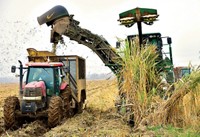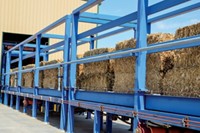Advertisement
Grab your lab coat. Let's get started
Welcome!
Welcome!
Create an account below to get 6 C&EN articles per month, receive newsletters and more - all free.
It seems this is your first time logging in online. Please enter the following information to continue.
As an ACS member you automatically get access to this site. All we need is few more details to create your reading experience.
Not you? Sign in with a different account.
Not you? Sign in with a different account.
ERROR 1
ERROR 1
ERROR 2
ERROR 2
ERROR 2
ERROR 2
ERROR 2
Password and Confirm password must match.
If you have an ACS member number, please enter it here so we can link this account to your membership. (optional)
ERROR 2
ACS values your privacy. By submitting your information, you are gaining access to C&EN and subscribing to our weekly newsletter. We use the information you provide to make your reading experience better, and we will never sell your data to third party members.
Energy
Chevron, Texas A&M Will Research Biofuels
Partnership seeks conversion of nonfood crops into renewable transportation fuel
by Glenn Hess
May 31, 2007
Chevron has entered an agreement with Texas A&M University to study ways of producing and converting specially grown nonfood crops into ethanol and other biofuels.
During a four-year period, Chevron says it will support research by Texas A&M into crops dedicated for producing cellulose and processes for converting the biomass into biofuels.
In the U.S., most ethanol is currently produced from corn. Biofuels could be made from cellulose, a carbohydrate that is found in the stems, stalks, and leaves of green plants. But a number of barriers must be overcome.
One of the primary technical and scientific challenges of making biofuels from cellulose is designing a low-cost method for breaking down cellulose, which is bound in the plant cell wall, into its sugar building blocks. These sugars can be fermented into ethanol or other biofuels.
"Cellulosic ethanol, as opposed to sugar or starch-based ethanol, broadens the choice of feedstock without impacting food supplies," says Rick Zalesky, vice president of biofuels and hydrogen for Chevron Technology Ventures.
"Making it commercially viable poses a number of scientific and technical challenges, challenges that we believe the faculty, staff, and students at one of the world???s premier universities in agricultural sciences and engineering are well-equipped to overcome," Zalesky adds.
Financial details of the partnership between Chevron Technology Ventures, a division of Chevron USA, and Texas A&M???s Agriculture & Engineering BioEnergy Alliance were not disclosed.
In addition to the Texas A&M agreement, Chevron???s biofuels business unit has formed research arrangements with Georgia Tech; the University of California, Davis; and the Colorado Center for Biorefining & Biofuels, which is a consortium of the Energy Department???s National Renewable Energy Laboratory, three major Colorado universities, and other private companies.
In a related development, Chevron says its large-scale biodiesel plant in Galveston, Texas, is fully operational (C&EN, May 22, 2006, page 19). The facility will initially produce 20 million gal of biodiesel per year and has the capability to expand operations to produce up to 110 million gal annually.
Chevron Technology Ventures has a 22% equity position in the plant. It will produce biodiesel from soybeans and other renewable feedstocks for use in the marine, commercial, trucking, and industrial markets.




Join the conversation
Contact the reporter
Submit a Letter to the Editor for publication
Engage with us on Twitter